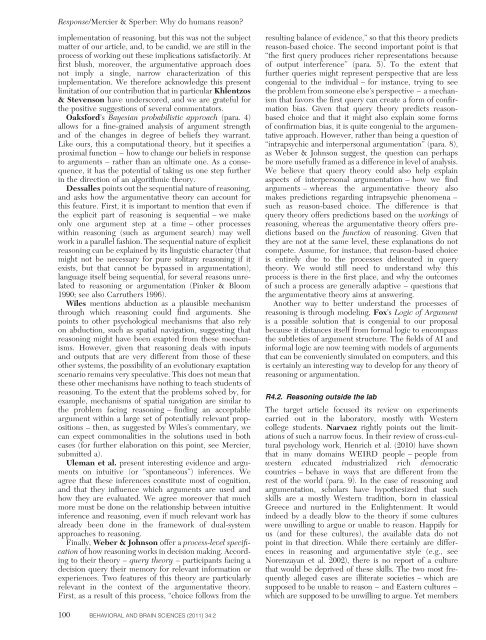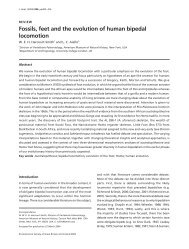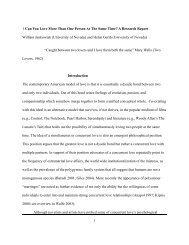Why do humans reason? Arguments for an argumentative theory
Why do humans reason? Arguments for an argumentative theory
Why do humans reason? Arguments for an argumentative theory
Create successful ePaper yourself
Turn your PDF publications into a flip-book with our unique Google optimized e-Paper software.
Response/Mercier & Sperber: <strong>Why</strong> <strong>do</strong> <strong>hum<strong>an</strong>s</strong> <strong>reason</strong>?implementation of <strong>reason</strong>ing, but this was not the subjectmatter of our article, <strong>an</strong>d, to be c<strong>an</strong>did, we are still in theprocess of working out these implications satisfactorily. Atfirst blush, moreover, the <strong>argumentative</strong> approach <strong>do</strong>esnot imply a single, narrow characterization of thisimplementation. We there<strong>for</strong>e acknowledge this presentlimitation of our contribution that in particular Khlentzos& Stevenson have underscored, <strong>an</strong>d we are grateful <strong>for</strong>the positive suggestions of several commentators.Oaks<strong>for</strong>d’s Bayesi<strong>an</strong> probabilistic approach (para. 4)allows <strong>for</strong> a fine-grained <strong>an</strong>alysis of argument strength<strong>an</strong>d of the ch<strong>an</strong>ges in degree of beliefs they warr<strong>an</strong>t.Like ours, this a computational <strong>theory</strong>, but it specifies aproximal function – how to ch<strong>an</strong>ge our beliefs in responseto arguments – rather th<strong>an</strong> <strong>an</strong> ultimate one. As a consequence,it has the potential of taking us one step furtherin the direction of <strong>an</strong> algorithmic <strong>theory</strong>.Dessalles points out the sequential nature of <strong>reason</strong>ing,<strong>an</strong>d asks how the <strong>argumentative</strong> <strong>theory</strong> c<strong>an</strong> account <strong>for</strong>this feature. First, it is import<strong>an</strong>t to mention that even ifthe explicit part of <strong>reason</strong>ing is sequential – we makeonly one argument step at a time – other processeswithin <strong>reason</strong>ing (such as argument search) may wellwork in a parallel fashion. The sequential nature of explicit<strong>reason</strong>ing c<strong>an</strong> be explained by its linguistic character (thatmight not be necessary <strong>for</strong> pure solitary <strong>reason</strong>ing if itexists, but that c<strong>an</strong>not be bypassed in argumentation),l<strong>an</strong>guage itself being sequential, <strong>for</strong> several <strong>reason</strong>s unrelatedto <strong>reason</strong>ing or argumentation (Pinker & Bloom1990; see also Carruthers 1996).Wiles mentions abduction as a plausible mech<strong>an</strong>ismthrough which <strong>reason</strong>ing could find arguments. Shepoints to other psychological mech<strong>an</strong>isms that also relyon abduction, such as spatial navigation, suggesting that<strong>reason</strong>ing might have been exapted from these mech<strong>an</strong>isms.However, given that <strong>reason</strong>ing deals with inputs<strong>an</strong>d outputs that are very different from those of theseother systems, the possibility of <strong>an</strong> evolutionary exaptationscenario remains very speculative. This <strong>do</strong>es not me<strong>an</strong> thatthese other mech<strong>an</strong>isms have nothing to teach students of<strong>reason</strong>ing. To the extent that the problems solved by, <strong>for</strong>example, mech<strong>an</strong>isms of spatial navigation are similar tothe problem facing <strong>reason</strong>ing – finding <strong>an</strong> acceptableargument within a large set of potentially relev<strong>an</strong>t propositions– then, as suggested by Wiles’s commentary, wec<strong>an</strong> expect commonalities in the solutions used in bothcases (<strong>for</strong> further elaboration on this point, see Mercier,submitted a).Ulem<strong>an</strong> et al. present interesting evidence <strong>an</strong>d argumentson intuitive (or “spont<strong>an</strong>eous”) inferences. Weagree that these inferences constitute most of cognition,<strong>an</strong>d that they influence which arguments are used <strong>an</strong>dhow they are evaluated. We agree moreover that muchmore must be <strong>do</strong>ne on the relationship between intuitiveinference <strong>an</strong>d <strong>reason</strong>ing, even if much relev<strong>an</strong>t work hasalready been <strong>do</strong>ne in the framework of dual-systemapproaches to <strong>reason</strong>ing.Finally, Weber & Johnson offer a process-level specificationof how <strong>reason</strong>ing works in decision making. Accordingto their <strong>theory</strong> – query <strong>theory</strong> – particip<strong>an</strong>ts facing adecision query their memory <strong>for</strong> relev<strong>an</strong>t in<strong>for</strong>mation orexperiences. Two features of this <strong>theory</strong> are particularlyrelev<strong>an</strong>t in the context of the <strong>argumentative</strong> <strong>theory</strong>.First, as a result of this process, “choice follows from theresulting bal<strong>an</strong>ce of evidence,” so that this <strong>theory</strong> predicts<strong>reason</strong>-based choice. The second import<strong>an</strong>t point is that“the first query produces richer representations becauseof output interference” (para. 5). To the extent thatfurther queries might represent perspective that are lesscongenial to the individual – <strong>for</strong> inst<strong>an</strong>ce, trying to seethe problem from someone else’s perspective – a mech<strong>an</strong>ismthat favors the first query c<strong>an</strong> create a <strong>for</strong>m of confirmationbias. Given that query <strong>theory</strong> predicts <strong>reason</strong>basedchoice <strong>an</strong>d that it might also explain some <strong>for</strong>msof confirmation bias, it is quite congenial to the <strong>argumentative</strong>approach. However, rather th<strong>an</strong> being a question of“intrapsychic <strong>an</strong>d interpersonal argumentation” (para. 8),as Weber & Johnson suggest, the question c<strong>an</strong> perhapsbe more usefully framed as a difference in level of <strong>an</strong>alysis.We believe that query <strong>theory</strong> could also help explainaspects of interpersonal argumentation – how we findarguments – whereas the <strong>argumentative</strong> <strong>theory</strong> alsomakes predictions regarding intrapsychic phenomena –such as <strong>reason</strong>-based choice. The difference is thatquery <strong>theory</strong> offers predictions based on the workings of<strong>reason</strong>ing, whereas the <strong>argumentative</strong> <strong>theory</strong> offers predictionsbased on the function of <strong>reason</strong>ing. Given thatthey are not at the same level, these expl<strong>an</strong>ations <strong>do</strong> notcompete. Assume, <strong>for</strong> inst<strong>an</strong>ce, that <strong>reason</strong>-based choiceis entirely due to the processes delineated in query<strong>theory</strong>. We would still need to underst<strong>an</strong>d why thisprocess is there in the first place, <strong>an</strong>d why the outcomesof such a process are generally adaptive – questions thatthe <strong>argumentative</strong> <strong>theory</strong> aims at <strong>an</strong>swering.Another way to better underst<strong>an</strong>d the processes of<strong>reason</strong>ing is through modeling. Fox’s Logic of Argumentis a possible solution that is congenial to our proposalbecause it dist<strong>an</strong>ces itself from <strong>for</strong>mal logic to encompassthe subtleties of argument structure. The fields of AI <strong>an</strong>din<strong>for</strong>mal logic are now teeming with models of argumentsthat c<strong>an</strong> be conveniently simulated on computers, <strong>an</strong>d thisis certainly <strong>an</strong> interesting way to develop <strong>for</strong> <strong>an</strong>y <strong>theory</strong> of<strong>reason</strong>ing or argumentation.R4.2. Reasoning outside the labThe target article focused its review on experimentscarried out in the laboratory, mostly with Westerncollege students. Narvaez rightly points out the limitationsof such a narrow focus. In their review of cross-culturalpsychology work, Henrich et al. (2010) have shownthat in m<strong>an</strong>y <strong>do</strong>mains WEIRD people – people fromwestern educated industrialized rich democraticcountries – behave in ways that are different from therest of the world (para. 9). In the case of <strong>reason</strong>ing <strong>an</strong>dargumentation, scholars have hypothesized that suchskills are a mostly Western tradition, born in classicalGreece <strong>an</strong>d nurtured in the Enlightenment. It wouldindeed by a deadly blow to the <strong>theory</strong> if some cultureswere unwilling to argue or unable to <strong>reason</strong>. Happily <strong>for</strong>us (<strong>an</strong>d <strong>for</strong> these cultures), the available data <strong>do</strong> notpoint in that direction. While there certainly are differencesin <strong>reason</strong>ing <strong>an</strong>d <strong>argumentative</strong> style (e.g., seeNorenzay<strong>an</strong> et al. 2002), there is no report of a culturethat would be deprived of these skills. The two most frequentlyalleged cases are illiterate societies – which aresupposed to be unable to <strong>reason</strong> – <strong>an</strong>d Eastern cultures –which are supposed to be unwilling to argue. Yet members100 BEHAVIORAL AND BRAIN SCIENCES (2011) 34:2




